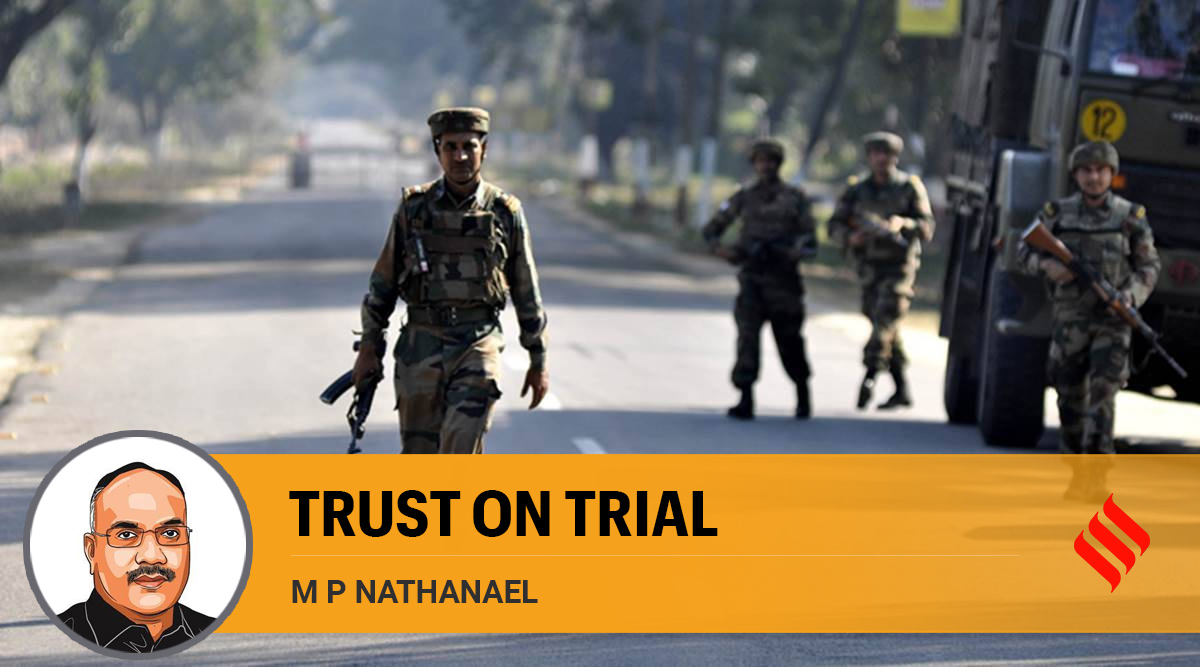 The army has the option to court martial the accused personnel — which in all likelihood it will. However, a trial in a civil court will go a long way in assuaging the hurt sentiments of the local people.
The army has the option to court martial the accused personnel — which in all likelihood it will. However, a trial in a civil court will go a long way in assuaging the hurt sentiments of the local people.The SIT report indicting the para commandos of the Army for the botched operations on December 4 last year in Nagaland’s Mon district is on expected lines. The army personnel have been accused of not adhering to the Standard Operating Procedure (SOP) — this led to indiscriminate firing on the vehicle carrying the miners, resulting in the death of six of them. Two others were seriously injured. Had it not been for these two survivors, much crucial evidence would have been lost. The Army commandos resorted to firing “without ensuring positive identification” and thereafter, reportedly, attempted to cover up the wanton killings by covering the bodies with a tarpaulin and sitting over them. After the villagers rushed to the spot in search of their kin, they spotted the bodies and questioned the soldiers. The attempt to cover up the killings infuriated the villagers, leading to further violence in which six more villagers and a jawan of the Assam Rifles lost their lives.
Though the Nagaland Government had sent the report to the Department of Military Affairs in the first week of April and even issued a reminder, the officers have not yet been prosecuted because the civil courts cannot try them without the Centre’s sanction. Meanwhile, a Court of Inquiry, constituted by the Army authorities, headed by a Major General is reported to have been completed. Under Section 6 of the Armed Forces Special Powers Act 1958, (AFSPA), “no prosecution, suit or other legal proceedings shall be instituted, except with the previous sanction of the Central Government, against any person in respect of anything done or purported to be done in exercise of powers conferred by the Act.”
The army has the option to court martial the accused personnel — which in all likelihood it will. However, a trial in a civil court will go a long way in assuaging the hurt sentiments of the local people.
The fact that the Nagaland Government is led by the United Democratic Alliance (UDA), a part of the Northeast Democratic Alliance, will play a role in the Centre’s decision to sanction the prosecution of the Army personnel. Currently, there is no opposition party in Nagaland after the merger of the erstwhile opposition party, the Naga People’s Front, with the ruling party.
Best of Express Premium
This incident has led to demands for revoking the AFSPA. The Centre has acquiesced by withdrawing the enforcement of the Act from several parts of Nagaland, Manipur and Assam, giving a modicum of relief to the people of these states and raising the hope that the AFSPA will be lifted from other parts of the states too.
Prime Minister Narendra Modi recently assured the people of the Northeast that the government intends to withdraw the draconian Act completely from the region. Nagaland has largely borne the brunt of the law after it was imposed in the late 1950s when insurgency raised its head in the state.
The trial of the Army personnel will also go a long way in serving as a deterrent to others — there are several accusations of fake encounters by the Army and the police in the Northeast. The unbridled power provided by the AFSPA to the security forces does create conditions for heavy-handedness. In 2012, the Extra Judicial Execution Victim Families Association of Manipur (EJEVFAM) approached the Supreme Court to have 1,528 cases of alleged fake encounters investigated by the CBI. The first six cases investigated on the court’s directive were found to be fake encounters. This prompted the Court to conclude that the veracity of the allegations made by the Association was beyond suspicion. In recent times, the AFSPA has attracted criticism from the Supreme Court on more than one occasion. Trials in all these cases need to be put on the fast track. The matter has been hanging fire for too long.
The writer is a retired Inspector General of Police CRPF
- The Indian Express website has been rated GREEN for its credibility and trustworthiness by Newsguard, a global service that rates news sources for their journalistic standards.

